Many Wars Ago Blu-ray Movie
HomeMany Wars Ago Blu-ray Movie 
Uomini controRaroVideo U.S. | 1970 | 101 min | Not rated | Jan 07, 2014
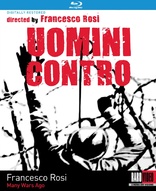
Price
List price:Amazon: $25.44 (Save 27%)
Third party: $25.44 (Save 27%)
Only 1 left in stock (more on the way).
Movie rating
7.1 | / 10 |
Blu-ray rating
| Users | 0.0 | |
| Reviewer | 3.5 | |
| Overall | 3.5 |
Overview
Many Wars Ago (1970)
On the Italian/Austrian front during World War I, a disastrous Italian attack upon the Austrian positions leads to a mutiny among the decimated Italian troops.
Starring: Mark Frechette, Alain Cuny, Gian Maria Volontè, Giampiero Albertini, Pier Paolo CapponiDirector: Francesco Rosi
| Foreign | Uncertain |
| War | Uncertain |
| Drama | Uncertain |
Specifications
Video
Video codec: MPEG-4 AVC
Video resolution: 1080p
Aspect ratio: 1.35:1
Original aspect ratio: 1.66:1
Audio
Italian: DTS-HD Master Audio 2.0
Subtitles
English
Discs
25GB Blu-ray Disc
Single disc (1 BD)
Packaging
Slipcover in original pressing
Playback
Region A, B (C untested)
Review
Rating summary
| Movie | 3.5 | |
| Video | 3.5 | |
| Audio | 4.0 | |
| Extras | 3.0 | |
| Overall | 3.5 |
Many Wars Ago Blu-ray Movie Review
"Sometimes one doesn't know what one's duty is."
Reviewed by Casey Broadwater January 16, 2014There have been some truly great films about it—Paths of Glory, Abel Gance's J'Accuse, The Grand Illusion, Wings— but the Great War seems underrepresented in the movies, particularly after World War II. The greatest generation engaged in a struggle both inherently more cinematic and more black-and-white, morally speaking, a Hollywood-ready war that gave us the most manifestly evil movie villains ever —the Nazis—and continues to carry a sense of weighty, history-altering import. In contrast, the First World War seems abstract and absurd and ineffectual, fought inch-by-inch, with soldiers scrambling over the trenches against machine gun fire and mustard gas, all to gain meaningless control over meaningless stretches of no-man's-land. If the American Civil War was the first "modern" war, World War I was the Modernist war; it challenged our faith in social hierarchy, in the might-makes-right good of government, in faith itself.
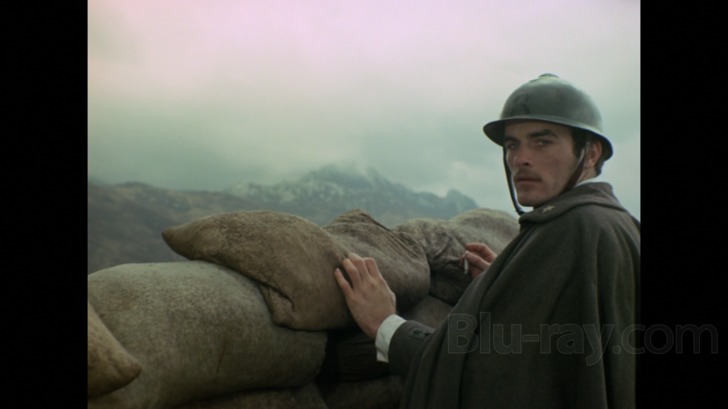
Mark Franchette
It's particularly for this reason that the best films about the Great War tend to be more consciously philosophical, as opposed to being merely rah-rah patriotic action epics. A fantastic and underseen example is director Francesco Rosi's Many Wars Ago, released in 1970 and based on an autobiographical novel by Emilio Lussu. The film's Italian title—Uomini contro—literally means Men Against, which doesn't roll off the tongue quite as easily but better suggests the story's themes of rebellion and ambiguous opposition. For the Italian soldiers in the film, it's unclear who, exactly, is the real enemy—the faceless Austrians in bunkers atop a strategically important hill, or the commanders in their own trenches, ordering them daily to their deaths.
Set late in the war, along the Isonzo Front between Italy and Slovenia—where much of Hemingway's A Farewell to Arms also takes place— Many Wars Ago follows several characters who come to exemplify various attitudes towards the war and Italian society of the time. The closest we come to a protagonist is Lieutenant Sassu (Mark Frachette), a young intellectual who requests to be transferred to the front in order to experience war first-hand, but quickly finds the mindless bloodshed to be morally repugnant. His increasingly anti-war stance is mirrored in the actions of two sympathetic corporals, the kind Santini (Pier Paolo Caponi), who subverts direct orders and sacrifices himself to prove a point, and the calculating Ottolenghi (Gian Maria Volonté), a socialist who—if he had his way—would like to see all of the generals and higher-ups on both sides of the war killed for perpetuating this bloody nonsense.
The militaristic and societal "old guard" is represented by General Leone (La Dolce Vita's Alain Cuny), an aristocratic hardass who thinks nothing of sending poor farmers in soldier's garb up over the trenches to be slaughtered. Explaining that "In war, discipline is painful but necessary," he orders deserters to be promptly executed and, on mutinous troops, employs the ancient Roman military punishment of decimation, choosing ten men at random to be shot in front of the rest of their regiment as an example. In one scene, he commands a scared private to demonstrate his courage by standing up out of a trench in full view of the Austrian snipers on the other side...with the expected result. In another, he sends a squad up the hill wearing heavy head-and-torso-covering metal body armor, giving them the appearance of displaced knights. Not only does this illustrate just how medieval WWI warfare could be, it also implies not so subtly that in a modern, industrialized war, these iron-clad, face-obscured men were viewed as anonymous, dispensable killing machines. But they too get mowed down. By recounting the atrocities that Italian commanders committed against their own own troops, Rosi is out to destroy the idea of "noble" war and show how the lower classes, impelled by duty and patriotism alone, were and continue to be exploited without rhyme or reason. Nothing has changed.
Given that both involve suicide missions, near-comic court martial proceedings, and soldiers caught in the absurdist non-logic of wartime, there are obvious parallels here to Stanley Kubrick's 1957 anti-war classic, Paths of Glory. Kubrick's film draws its title from a line in Thomas Gray's poem Elegy Written in a Country Churchyard—"The paths of glory lead but to the grave"—and Rosi mines that same idea. There is no glory in war, only pointless death.
Saying Many Wars Ago is a "lesser" Italian version of Paths of Glory, however—while arguably true—would be a bit harsh, as the film has plenty of its own merits. Where Kubrick's camerawork in Paths is elegant and considered, which has a somewhat distancing effect, the photography in Many Wars—by Rosi's go-to cinematographer, Pasqualino De Santis—is raw and immediate, shot in muted colors that emphasize the dreariness of trench warfare. The film also has quite a cast. Alain Cuny is perfectly despicable as the hoggish old general, and Gian Maria Volonté—who stars in the Criterion Collection's recently released Investigation of a Citizen Above Suspicion—is a real presence. Acting-wise, the film is probably most notable for hosting one of only three performances from American panhandler/carpenter-turned-accidental movie star Mark Frachette, who was discovered by Michelangelo Antonioni when the director was in the U.S. casting a lead for his counterculture epic, Zabriskie Point. After Many Wars Ago, Frachette—who belonged to The Lyman Family, a cultish commune in Boston—appeared in one other Italian film, La grande scofa nera, and was soon thereafter arrested for robbing a bank with two of his fellow commune comrades. Only twenty-seven, he died in a suspicious weightlifting accident after two years in prison, leaving behind a short and strange onscreen legacy.
Many Wars Ago Blu-ray Movie, Video Quality 
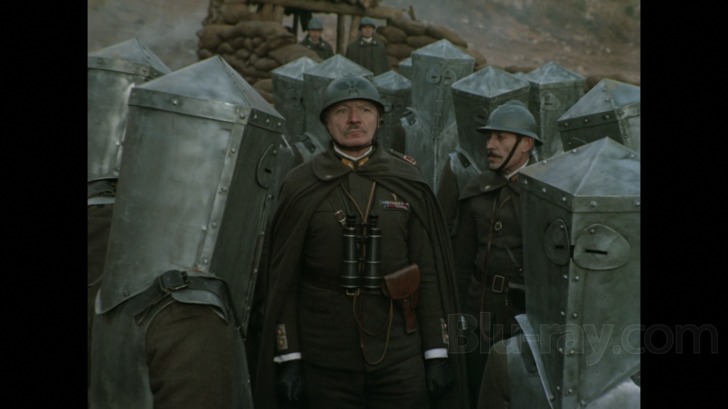
Note on the Restoration of Many Wars Ago:
As described in this note—which is included in the booklet that comes with the film—the existing source print for Many Wars Ago is not without its issues, which largely stem from the way the film was copied in the absence of the original negative. Small specks occasionally dot the image, color flickers in certain scenes, and the picture can sometimes look a little flat, with muted contrast and saturation. That said, RaroVideo's 1080p/AVC-encoded transfer is much more watchable than this description would suggest. The newfound clarity, especially, is far beyond what would be possible in standard definition, and it's clear that some restoration work has been undertaken to balance the color as much as is currently possible. Further, there are no signs of edge enhancement, digital noise reduction, or excessive filtering of any kind. There are only two real hiccups here. The first is the decision to use a single-layer Blu-ray disc and a level of compression that sometimes manifests in visual artifacts—with noticeable banding in two or three scenes—and the second is the odd choice of a 1:35:1 aspect ratio, a hair wider than the 1.33:1 "Academy" ratio and not wide enough for the common European theatrical ratio of 1.66:1 at which the film was probably exhibited. The booklet does thank Francesco Rosi "for his collaboration to the digital restoration," so the director presumably signed off, at least, on this quasi-open-matte presentation.
Many Wars Ago Blu-ray Movie, Audio Quality 
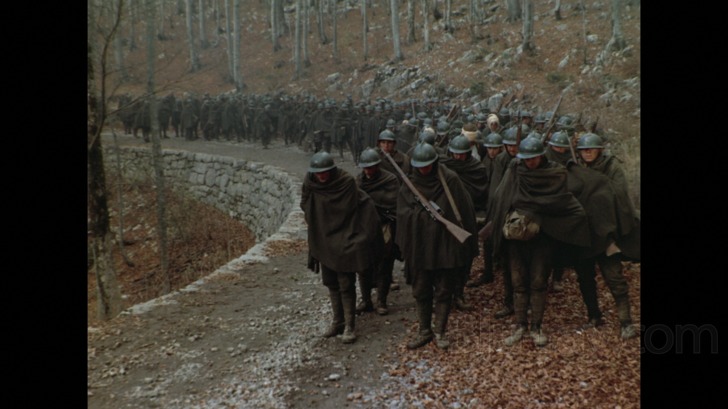
The disc features a lossless DTS-HD Master Audio 2.0 mono track that faithfully reproduces the film's original sound design and score. Like most films from this era, dynamic range is limited—noticeable during the more aurally frantic action sequences—but the effects are as punchy as they need to be, with no overt brashness or cracking. Likewise, dialogue can sometimes sound a bit mid-heavy, but is nonetheless easy to understand and well-balanced in the mix. The standout here is the memorable score from prolific Italian composer Piero Piccioni (Swept Away, Contempt, The Seduction of Mimi), and his arrangements sound as rich and full as they probably ever will. The disc includes optional English subtitles, which appear in white lettering.
Many Wars Ago Blu-ray Movie, Special Features and Extras 
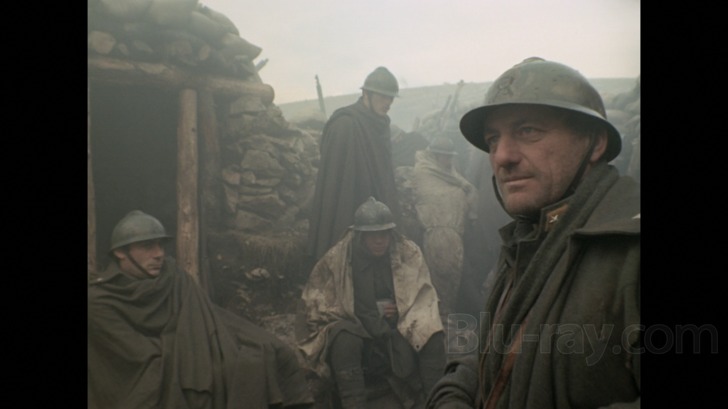
- Interview with Director Francesco Rosi (HD, 28:31): An excellent interview with Rosi, who recounts the difficulty of getting the film made and describes his intent to recount the atrocities of modern war and, specifically, to ridicule the "rhetorical image" of World War I.
- Film Restoration: Before and After (HD, 2:09): A side-by-side demonstration of the clean-up work and color balancing applied to this new remaster.
- Original Screenplay: A .pdf copy of the screenplay, only accessible via a computer with a Blu-ray drive.
- Booklet: Inside the case, you'll find a 20-page booklet with short essays by Lorenzo Codelli and director Francesco Rosi, excerpts from numerous reviews of the film, and notes on the restoration.
Many Wars Ago Blu-ray Movie, Overall Score and Recommendation 
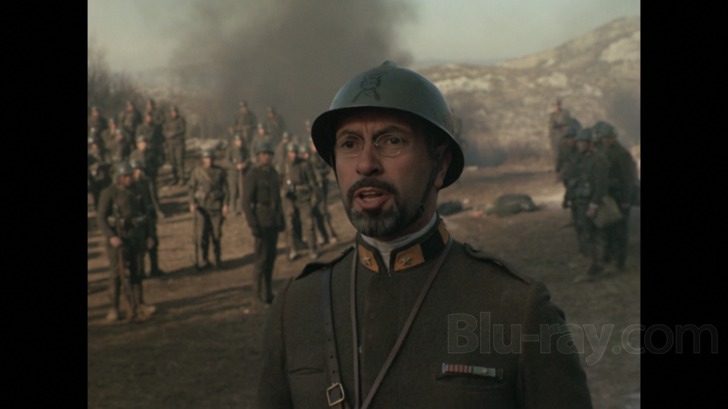
Although it covers some of the same thematic ground as Stanley Kubrick's Paths of Glory—the absurdities of a war run by the upper-crust but fought by the lower class—Francesco Rosi's Many Wars Ago fights the anti-war fight in its own way, highlighting the tedium and terror of The Great War's trenches. It's a little-seen film, but it should get some much-deserved exposure thanks to RaroVideo's terrific Blu-ray release, which includes a nearly half-hour interview with the director, insight into the restoration process, and a 20-page booklet with essays and commentary. Recommended for all war movie buffs who think they've seen everything.
Similar titles
Similar titles you might also like

Westfront 1918
Westfront 1918: Vier von der Infanterie
1930

The Front Line
고지전 / Go-ji-jeon
2011

Fires on the Plain 4K
野火 / Nobi
1959

The Bridge
Die Brücke
1959

La Grande Illusion
Grand Illusion
1937

Wooden Crosses
Les croix de bois
1932

Sophie Scholl: The Final Days
Sophie Scholl: Die letzten Tage | 4K Restoration
2005

Lebanon
2009

City of Life and Death
南京!南京! / Nanjing! Nanjing!
2009

Ivan's Childhood
Ива́ново де́тство / Ivanovo detstvo
1962

Story of a Prostitute
春婦伝 / Shunpu den
1965

Shame
Skammen
1968

Stalingrad
1993

Operation Red Sea
红海行动 / Hong hai xing dong
2018

The Eight Hundred
八佰 / Ba bai
2020

A Hidden Life
2019

Hiroshima
ひろしま / Arrow Academy
1953

J'accuse
I Accuse
1938

The Human Condition I: No Greater Love
人間の條件 / Ningen no jôken / Parts 1 and 2
1959

The Cranes Are Flying
Летят журавли / Letyat zhuravli
1957